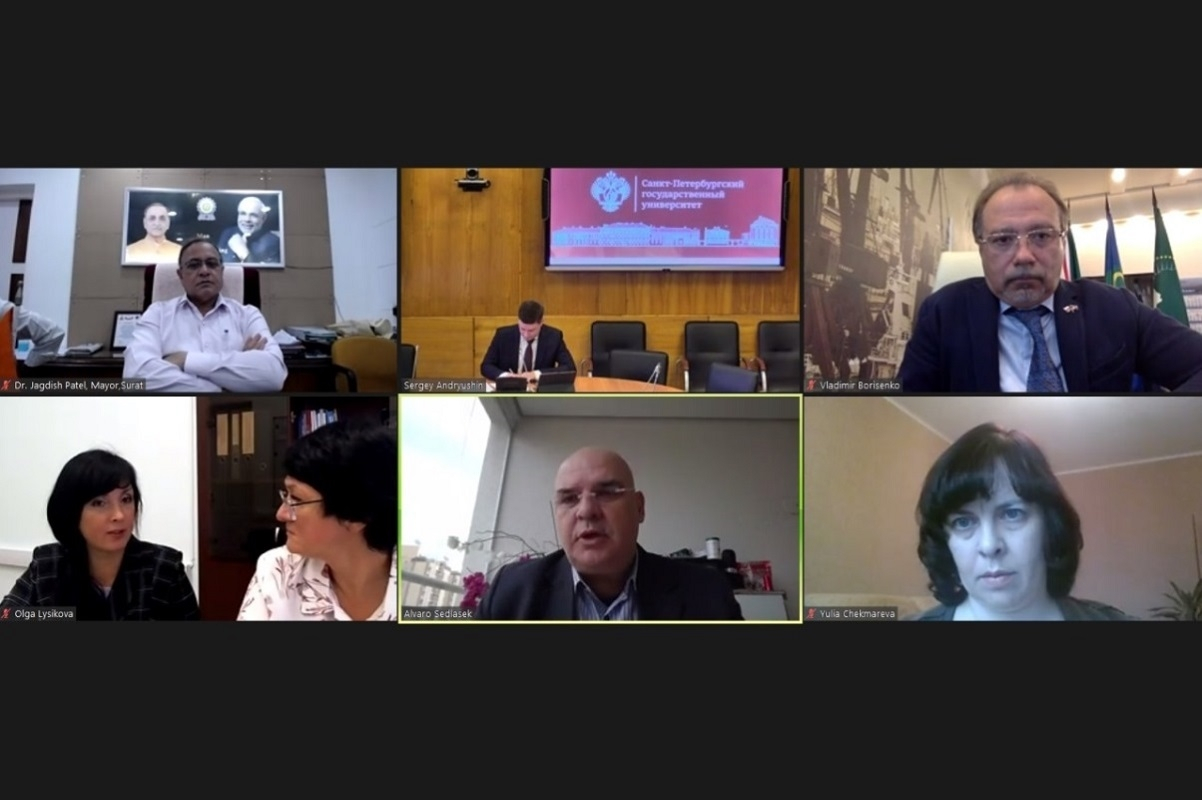A balance between fundamental knowledge and new skills: BRICS experts

St Petersburg has hosted the 2nd BRICS International Municipal Forum. Due to the pandemic, it was moved online and brought together over 200 speakers and 3,000 participants from the BRICS countries and Italy, Spain, Argentina, Mali, Peru, Nigeria, Mongolia, Mexico, Egypt, and Germany to name but a few.
The Forum’s programme featured a round-table discussion ‘Citizen participation and digitisation of public governance’ that was organised by St Petersburg University. Among its presenters was Professor Leonid Smorgunov, Head of the Department of Political Governance at the University, and other experts from Russia and around the world. The session focused on the risk analysis of and opportunities for citizen participation in public governance in the context of its digitisation.
Professor Leonid Smorgunov reported that digitisation of public governance is the mainstream of the Fourth Industrial Revolution. Public engagement is both an opportunity and a threat. One of the threats, as Professor Smorgunov put it, lies in a challenge for public governance. 'Some time ago, the principle element of good governance referred to efficiency, sensitivity, reporting, and sustainable development. Today, these factors still remain, and at the heart of ensuring good governance is public engagement’, said Professor Leonid Smorgunov.
A wide range of technologies, such as big data analysis, the Internet, blockchain, artificial intelligence, and an e-format of citizen involvement, can be conflicting at times.
Professor Leonid Smorgunov, Head of the Department of Political Governance at St Petersburg University
The business session ‘High-calibre staff as a guarantee of future development of the BRICS state members’ was moderated by Sergey Andryushin, Deputy Rector for International Affairs at the University. The session brought together both Russian and world-leading experts to share experience in how they prepare specialists in the context of globalisation of the economy. This may create both opportunities and threats for education globally.
In his opening speech, Petr Kucherenko, Deputy Minister of Science and Higher Education, read the address of the Minister of Science and Higher Education Valery Falkov. As Valery Falkov put it, although the conference moved online due to the pandemic, it was as efficient as ever. ‘Even during the pandemic, we can discuss major issues relating to regional and municipal governance by using high-technology video conferencing solutions’, said Valery Falkov in his address. ‘The Forum will no doubt foster cooperation between the BRICS countries’.
Commitment to supporting the highest calibre of staff ensures efficiency and effectiveness of the modernisation of the economy and countries, says Sergey Andryushin. To that end, we must ensure that we work in partnership with government, business, industry and other external organisations, and mass media, he added.
Today, St Petersburg University is co-working with businesses on a regular basis. We have signed about 2,000 agreements with a wide range of companies. Engaging with business shapes our research and education, directly influencing learning and teaching.
Sergey Andryushin, Deputy Rector for International Affairs at St Petersburg University
The discussion focused on how to make education more competitive, from primary to higher education. Balancing between gaining fundamental knowledge and acquiring new skills is essential for students to gain success in future, said Sergei Stanchenko, Director of the Federal Institute for Evaluation of Education Quality. 'On the one hand, we provide a quality of fundamental education at school, as we can see from the research findings worldwide. On the other hand, focusing on acquiring new skills is important to ensure that we will be able to respond to today and tomorrow’s challenges. Does it imply a shift from fundamental education towards practical learning of the Internet and technologies? Presumably, no,’ said Sergei Stanchenko. How successfully you can process information on the Internet depends on what picture of the world you have, how well you can work within the context and what understanding of the basic concepts you have in a sphere you are searching for information, he added.
Innovations and new ideas in education are fundamental to success of the next generations, said Manik M. Jolly, the founder and CEO of the G.R.I.D., India. It may be worthwhile to initiate the staff training mobility programmes between the BRICS state members to give staff a possibility to acquire knowledge and skills abroad that are at times impossible to acquire in a home country, suggested Manik M. Jolly. 'A country with few oil reserves will hardly educate people to work in the oil and gas industry. Thus, it is worthwhile to adopt innovations of the partners from other countries by sending the students to study there,’ said Manik M. Jolly.
Yet the key question we should approach relating to our education remains the same, experts said. This is what competences we should teach students today to ensure that they will be competitive in future. In the pre-pandemic period, there was an annual rise of 10% in the need to acquire new skills to hold the current position at the office, said Iuliia Chekmareva, Director of the Centre for Teaching Foreign Languages. One third of skills became redundant within two or three years. At the heart of your professional success is not only what education you have, but also the soft skills you develop that are universal and go beyond a person’s knowledge and occupational skills. Commitment to developing soft skills should be at the focus of our education, she said.
St Petersburg hosts the BRICS International Municipal Forum for the second time, under the Russian BRICS Chairmanship in 2020. It brings together the representatives of the state and municipal governments, business community, and academia from over 70 regions in Russia and fast-developing countries: Brazil, India, China, and South Africa. The Forum’s business programme featured discussions on regional and municipal economy and social development in the BRICS state members.

